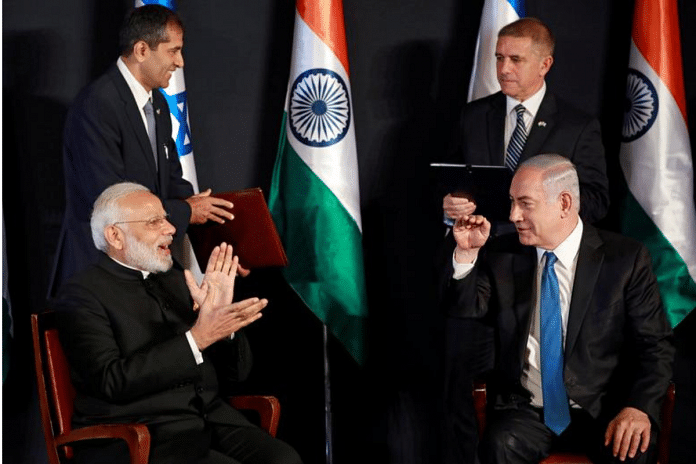Democracy is a rare reality when it comes to the countries of Asia and Africa. Only two multiparty parliamentarian democracies have done well in Asia – India and Israel – since World War II. Israel was established in 1948 and India became an independent nation in 1947. They have both completed 75 years of an extraordinary political journey as parliamentary democracies that have given freedom to the press and have a robust civil society comprising multireligious and ethnically diverse communities, besides being economically prosperous modern States. Their internal struggles are alike as well — between people with religious worldviews and those influenced by Western modernity and desire that the State and laws be rational, secular, and liberal.
Populist and majoritarian leaders emerged in both nations around the same decade—early 1990s—and now, they fear a weakening of democracy. Due to these and many more similarities, Israel can be seen as a sister democracy of India.
Many Indian leaders and intellectuals like Jayaprakash Narayan or JP, Ashok Mehta, Vinoba Bhave, Narayan Desai, Acharya Kripalani, and ML Sondhi were inspired by the fact that Israel was a democracy and adopted socialism. VD Savarkar and some Hindu nationalists admired that Israel declared itself a Jewish State. They were critical of Jawaharlal Nehru’s diplomatic boycott of Israel under pressure from the Arab States. Israeli leaders and intellectuals, including primary founder David Ben-Gurion, Moshe Sharett, Martin Buber, and Hermann Kallenbach, were deeply fond of India.
In hindsight, the diplomatic distance between India and Israel, which stretched on for more than four decades, was unfortunate. Today, for New Delhi, there is much more to Israel than just transactional strategic ties.
Also read: Netanyahu’s judicial reform has brought Israelis to the streets, even IDF is protesting
From the ashes of Holocaust
Israel at 75 is a remarkable story for the Jews who suffered some of the worst social and political forms of violence for thousands of years due to antisemitic sentiments in Europe as well as in West Asia. Adolf Hitler’s ultra-racist-nationalist politics led to the killing of more than 60 lakh Jews during World War II. Many leaders outside Europe did not care enough about the Holocaust; some even made friends with Hitler because of their strategic self-interests — as Subhas Chandra Bose did from India. His descendent, Sarmila Bose, a journalist, academic, and lawyer, recently rendered an apology to the Jewry on behalf of his great uncle who was in Berlin for two years (1941-43) and said nothing public or private against what was done to the Jews.
Israel was established from the ashes of the Jews who perished in concentration camps, yet Ben-Gurion chose to reconcile with Germany by accepting reparations in the 1950s. Germany is one of the formidable allies of Israel today and strongly stands against any racial, cultural, and social discrimination against Jews or any other religious or ethnic group.
Also read: Israel is neutral on Ukraine for three reasons. India can align with it to…
Internal rifts taking centre stage
Israel was established as a Jewish State due to the persecution of Jews in the past and not so much because of religious-ethnic-nationalism. Secular, liberal, and universal ethos inspired early Israeli leaders for a substantial democracy, but now, a critical part of the Jewish population in Israel is seeking a greater role of religion in the State. The current political protests against the Benjamin Netanyahu government’s judicial reforms are part of the old debate between religious and non-religious principles in the government.
Beyond religion, Israeli society is deeply divided due to the ethnic, linguistic, and cultural diversities of the Jews who arrived from different parts of the world. Asian and African Jews are much at odds with Jews of European and Western origins, and their cultural and racial differences are not cohesive. Israel is more secure from external wars now with its military might and diplomatic peace with most of the Arab States. In the absence of an external existential threat, the inner contradictions and differences have taken centre stage. The greatest existential threat is from within as President Isaac Herzog said during his address to one of the largest gatherings of the Jewish Diaspora in Tel Aviv this week.
All major Jewish federations and umbrella organisations like the World Zionist Congress are holding their annual meetings in Israel this year to join the celebrations of its 75th anniversary. Netanyahu had to cancel his public address at a major Jewish conference in Tel Aviv due to the protests against him by thousands of Israelis as well as many Jewish leaders outside the country. They think that the far-Right leader’s recent political decisions can weaken Israeli democracy.
The State of Israel, by definition, has also been a State for overseas Jews who have a strong connection to Jerusalem. While they are partaking in the celebrations, there remains agitation against any institutional undemocratic reform and hence there is still an active participation in the ongoing political protests simultaneously. The pro-democracy movement has succeeded thus far as the Netanyahu government has taken a step back by suspending the legislature and agreeing to build consensus through dialogue, which is led by President Herzog. But the sentiment against it hasn’t died down, and celebrations are marked by protests and conflicting emotions.
Dr Khinvraj Jangid is Associate Professor and Director, Centre for Israel Studies, Jindal School of International Affairs, OP Jindal Global University, Sonipat. He is visiting faculty at Ben-Gurion University of the Negev, Israel. Views are personal.
(Edited by Humra Laeeq)



